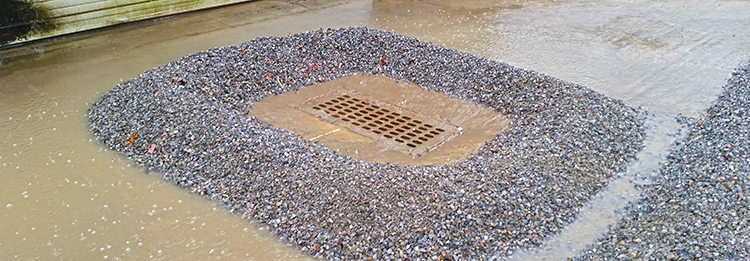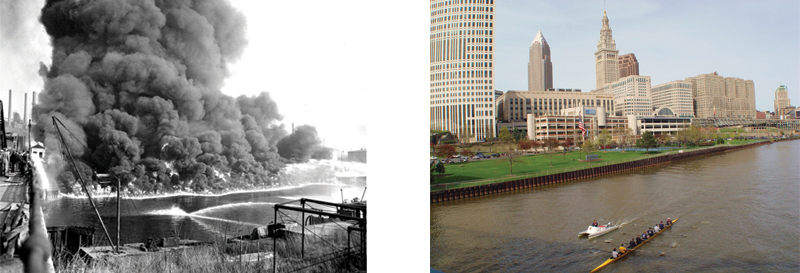We discuss problems with stormwater permits, and why we perceive them as being broken.
If you're like most folks responsible for your stormwater program, you know they can be confusing, annoying, and the state environmental agencies that are responsible for handling them often do a less-than-stellar job.
Here's a true story that happened to us recently. We submitted an NOI (Notice of Intent) and a co-submitted copy of the already existing SWPPP for an industrial facility in a nearby state, for coverage under that state's NPDES Industrial General Permit for Stormwater Discharges. Easy, easy stuff here folks.
We submitted it about 16 months ago, almost to the day of writing this post. Since then, we've gotten nothing from anyone in that state's environmental department. No confirmation that coverage had been authorized, or denied and additional information was required.
So about a month ago we reached out and spoke to an official at the agency, and here's their response:
We haven't reviewed the NOI or SWPPP yet.

My head almost exploded.
In 16 months, no one had the time to review the NOI or the SWPPP. Are they taking their own program seriously or what?
Maybe it's a reason why a lot of the regulated community, who should be taking these permits seriously, thinks they're a joke.
Save the understaffed, budget-cut rhetoric. This isn't a funding issue, this is a fundamental problem with NPDES stormwater permits seen nationwide, at least from our perspective of providing stormwater services to folks across the U.S. for over 25 years.
Stormwater permits work, but they are broken.
Let's get one thing straight right away.
I am wholeheartedly for stormwater regulations. In the long term they work, but they're hard to track. Since they came about some 25 years ago, they've drastically helped to create cleaner water all across the U.S. But, during this time, we've also built more and caused more pollution, so tracking their efforts is tricky (which I'll discuss below).
Make no doubts about it, they do work. But, just because they work doesn't mean they work efficiently.
The example above illustrates that perfectly. While the rules may work, the idea is flawed and needs to be fixed. You can't have an industrial facility left in limbo for over 16 months!
I don't mean to pick on the state in the example above, but this shows how these regulations are doing a disservice to the regulated community and the environment.
Think about it. The very agency that sets out to protect the environment isn't even doing that. They can't take the time to make sure someone is actually trying to follow the rules.

A brief explanation about stormwater permits.
In order to understand why they're broken, let's think about the permits themselves. Here's some brief, but to the point, information on the permits.
There are thousands of industrial facilities, municipalities, construction sites and more that require NPDES stormwater discharge permits. Given this huge universe of facilities potentially requiring permit coverage, most states, and the USEPA, have formulated a policy of attempting to cover these facilities primarily through the use of general permits, which are not facility-specific and instead are designed to cover a large number of facilities in a streamlined manner.
While not new or unique to NPDES permitting, this idea really came to the forefront under the need for permitting in the early 1990's, giving the regulated community nearly 25 years of experience under these permits.
An NPDES general permit is supposed to be a simplified permit which covers a group, or class of similar facilities, such as construction activities, type of industrial facilities, municipalities, etc.
A general permit does not address a specific facility. It's general. It applies to a wide variety of facilities. For instance, here in New Jersey we've got a concrete permit, which applies to ready-mix, precast, brick & block, and concrete pipe facilities.
The alternative is an individual permit, which as you can guess, is for an individual facility. They're usually complicated, lengthy, and expensive. These permits are for facilities that are radically different, and really stand out from others.

Stormwater permits are old and broken, and here's why.
So we know they're meant to work, and they do work, in a way, but here are reasons why they're broken.
Stormwater permits are taking too long to get.
The NOI-lack-of-response example above is extreme, but it's not alone.
The idea of an NOI is that it provides quick and easy notice to the permit-issuing agency that a regulated entity is seeking coverage under the general permit. It's supposed to be easy, quick, and relatively inexpensive in order to facilitate large numbers of facilities getting covered and into compliance.
Let's get this straight. It's a "hey, we're here, we want to follow the rules, give us a permit please" notice to the government. Most of these are a page or two at most. We're not talking War and Peace here.
But far too often, regulated agencies have taken too much time with the NOI, or made them overly complicated, or otherwise just muddled up the application process.
A normal turnaround time for an organization to comply with a regulation, address a problem, or respond to a governmental agency is anywhere between 30 and 90 days.
Hey regulators, we expect the same courtesies!
Stormwater permits are expiring left and right, and states don't keep up.
Here's another story.
We do a lot of work in one specific state, which has over a dozen stormwater general permits. Out of those, more than half are expired. And, most are over 1 year expired, with one being well over 6 years expired!
These permits are only good for 5 years, so we're now 2 permits behind on that one specific permit.

It is completely unacceptable!
This kind of disregard to the very rules and regulations they're meant to enforce, from the very government agency meant to protect the environment, is absurd!
No wonder people don't take this stuff as seriously as they should.
Instead of fine-tuning, learning from your mistakes, and revising a permit based on usage and past information, we're going nowhere!
During the time a permit is expired, facilities cannot technically modify their permit coverage since they're operating under an expired permit.
Hey regulators, guess what, we're all dealing with tighter budgets and smaller staffs. Taking years to do your job is ridiculous and is a slap in the face to all of us who are trying to do the right thing.
Stormwater general permits can be too… general!
An oxymoron, but bear with me.
General permits can be too vague, and often times leave the covered party in jeopardy of a violation, fine, or lawsuit due to unclear language.
The problem is many permits are too vague, have many poorly defined areas, and lead to uncertainty.
This uncertainty causes two problems.
First off, regulators, field inspectors, folks in the environmental agencies, etc., can, and normally do, interpret the information differently. This means misinformation or conflicting information which only ends up hurting organizations.
Secondly, these organizations end up with violations, fines, penalties, etc., because they either can't figure out the regulations or they're given bad information.
We've dealt with numerous facilities who were told this and that by one regulator, who was replaced by another regulator a few years later, who then gives them a violation for following the regulations wrong, even though the company was doing what they were told in the first place!
It can turn into a nightmare.
While general permits can't cover every detail, they should at least be clear enough that reasonably intelligent people can understand them and comply as intended.
Conversely, stormwater general permits are too complicated.
Most state NPDES permits are anywhere between 20 to 40 pages.
California's NPDES permit is over 100 pages.
The USEPA's Multi-Sector General Permit is 376 pages long!
Want to take a guess as to how clear and understandable these permits are?
This is not what was intended when these programs were started.
Newer versions of general permits, in their effort to cover more ground and address the grey areas I covered above, are becoming too complicated for the average facility to understand.
While this is great news for folks like myself, it's tough on the businesses that have to abide by these rules. A lot of these businesses don't have the staff, money, or resources to dedicate themselves to a complicated permit.
Not every industrial facility out there is a Ford plant or a Pepsi bottling plant. A lot of small businesses have to use the same permits as titans, and it's tough!
Plus, if you're a jack-of-all-trades at your company, and busy with this, that, and the other thing, even if you get the best stormwater training you can, there's no way you'll remember all this stuff.
Stormwater permits are getting expensive.
You operate a facility which needs a permit. Chances are your environmental agency is going to charge a fee for coverage, which can range anywhere from zero to thousands of dollars.
Ok, no problem. Now you need an SWPPP. Can you create your own SWPPP? Maybe, but the permit is too complicated, you don’t know what an SWPPP is, so you have to hire someone.
So you've got your SWPPP. Now you need annual stormwater training. You don't know why you need stormwater training, so that usually means hiring a consultant again.
Conversely, we do see facilities hire a part or full-time employee to handle environmental matters, or others hire a consulting firm, like ourselves, to act as their "employee" and handle all environmental matters. Regardless, you're looking at spending money.
You might have to hire a lab to take samples. You might have to hire a lab to analyze your samples. You might need sampling equipment. You might have to reconfigure your site to adhere to regulations.
You might have to buy additional equipment, or commit man-hours, or other resources to complying with your regulations.
And if you violate the permit, or your samples are bad, you could end up paying fines.
Point is, you're looking at a commitment of time and resources, every month and year going forward, as long as you have a permit.
Don't get me wrong, we're all behind clean water, me as much as anyone. That's why I'm in this business! But excessive costs can be counter-productive towards meeting the goal of clean water.
Most permits require too much.
In the old days, most permits were focused on "stormwater pollution prevention" and the use of best management practices, or stormwater BMPs.
We used to be told by agencies that there's just too much data generated by stormwater monitoring, so we'd only be relying on facilities to do the right thing.
Guess what, now we're monitoring. We're sampling, testing, and monitoring our stormwater. Sometimes it's annually. Sometimes it's quarterly. Sometimes it's monthly!
We're also finding that we're not monitoring enough! You should be doing more stormwater monitoring than your permit requires.
The worst thing, and I see it often, is where facilities have good monitoring results, but are issued a notice of violation for "failure to implement BMPs".
That would be like getting a penalty from the IRS for paying your taxes correctly, but you used TurboTax instead of TaxAct.
As long as you get the end result correct the methodology shouldn't matter as much as it does.
It's hard to prove that these regulations work.
Above I said they do work, now they don't? Bear with me.
For example, to the left is the Cuyahoga River on fire in 1969. To the right is the river today.

This is known as "the river that caught fire" which spurred the environmental movement back in the late 1960's.
Well, today the river's a lot better. It's not on fire, it's not as polluted as it was, thanks to both stormwater and process water regulations that were put in place.
That's an extreme example, but think about it.
When's the last time you read an annual report from your state agency which clearly demonstrated an increase in water quality from increasingly stringent stormwater general permit coverage?
Again, I think these regulations do work but come on. Help convince the people who are dealing with all these regulations that they're working. Throw us something!
Show us something that proves that the regulated community is doing a decent job and helping make things better. Show us it's not all about permits and fees as many permit holders think, but that we're actually protecting and enhancing the environment.
Usually, it's the opposite. Usually, it's lecturing, more fees, and pointing fingers at the 'big bad industrial facilities', construction activities, and municipalities. I'm not saying they're without fault, but let's show something to chart our progress!

So how do we fix broken stormwater permits?
We need to start thinking about the problem, now.
An immediate answer would be everyone gets individual permits tailored specifically for their facility.
But, it's unrealistic, expensive, complicated, and will never, ever happen.
So where does that leave us?
We have to stick with stormwater general permits, whether we like them or not.
They're our only choice, so we have to fix them. The concept of a general permit really ought to be reevaluated, including everything from how the regulatory agency's involved, to the cost of them, to identifying some realistic goals and targets so we can figure out what's working, and what isn't.
Unfortunately, this is all wishful thinking. We all know, as evident by my reasoning in this post, that getting the government to commit to any type of change is very difficult. For right now, we've all got to do our best to abide by the rules and play our part in the bigger picture.
If you're struggling with your permit, or need some help making sense out of yours, click here to contact us or call us at 609-693-8301 anytime to talk.

















